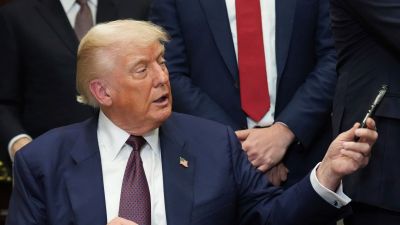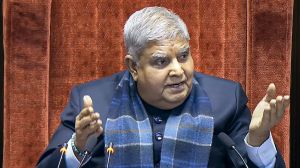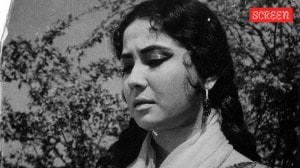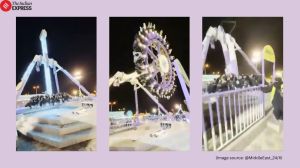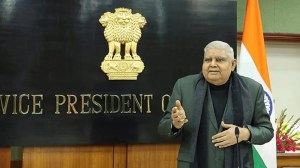‘The Kaurs of 1984’: New book records the wrongs done to Sikh women
The chapters in the book include “Chaurasi ki na insafi”, “From pens to guns”, “Militant bride”, “The daughter of a cop”, and “The widows in Delhi”, among others.
 The new book “Kaurs of 1984 – the untold, unheard stories of Sikh women”, published by HarperCollins (Express Photo)
The new book “Kaurs of 1984 – the untold, unheard stories of Sikh women”, published by HarperCollins (Express Photo)“Main chauraasi ki ladki hun (I am a woman who has survived 1984),” that’s all how a Sikh woman who was raped during the 1984 anti-Sikh genocide in Delhi describes herself. Now in her sixties, and still living the trauma she went through nearly 40 years ago, she could never pursue a legal battle to get her rapists punished, all due to social stigma and the fact that no one really ever tried to hear what women went through in the turbulent year of 1984.
The new book “Kaurs of 1984 – the untold, unheard stories of Sikh women”, published by HarperCollins, is one such effort to record and document those stifled voices of Sikh women who were raped, murdered and traumatised in 1984 during the Operation Bluestar and anti-Sikh genocide thereafter.
The book, with the oral histories of at least 40 women who saw it all, tells that 1984 wasn’t just about sufferings of turbaned men who were burnt alive with tyres around necks, but also women who in fact continue to suffer even after 40 years after men in the family were massacred. The women were raped, killed and some even took to weapons and turned militants in protest against the establishment and injustice.
Author of the book, Jammu-based Sanam Sutirath Wazir, 33, who had previously worked with the Amnesty International for the project “Justice for anti-Sikh massacre”, says: “Whenever a war or a conflict begins, it’s amid men but women are dragged into it anyhow. Women are the first casualties but their sufferings are never really documented.
Similar is the case for Operation Bluestar and anti-Sikh genocide. Women became casualties but history never really documented them. This book delves into the lives of at least 40 such women who had their own ordeals in the period beginning Operation Bluestar, genocide and even beyond. They are suffering even today. It’s not just them, but at least three of their generations suffering due to lack of resources and help. Though we conducted more than hundred interviews of women who braved 1984, the book features at least 40 of them.”
One such story is that of Nirpreet Kaur, a young college student back in 1984, whose father was burnt alive in front of her eyes during the anti-Sikh genocide. She moved to Punjab with her mother but soon picked up guns. She turned into a militant and was also jailed. She now runs an orphanage in Chandigarh. “She picked up guns in anger.
She was looking for justice for her father’s killing in that anger, and that anger only grows when the perpetrators of such heinous crimes are never punished but rather win elections and become ministers,” says Wazir.
The chapters in the book include “Chaurasi ki na insafi”, “From pens to guns”, “Militant bride”, “The daughter of a cop”, and “The widows in Delhi”, among others.
“Hundreds of Sikh women witnessed hell coming to life that year. These included women who were stranded inside the Golden Temple, who stood by their militant men, and those who were, at one time in their lives, militants themselves. They are rape survivors. They are among the murdered. They are the forgotten. Many of them are still fighting invisible battles for justice. The Kaurs of 1984 weaves together scattered stories of grief, betrayal, and loss,” Wazir says, adding that “this book is not about who was right or wrong during that period, but the extreme wrongs that we did to the women who were helpless and unheard”.



